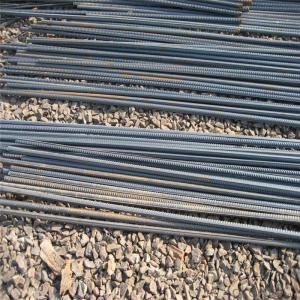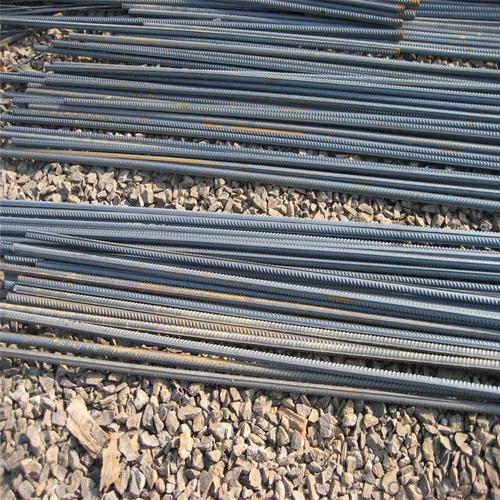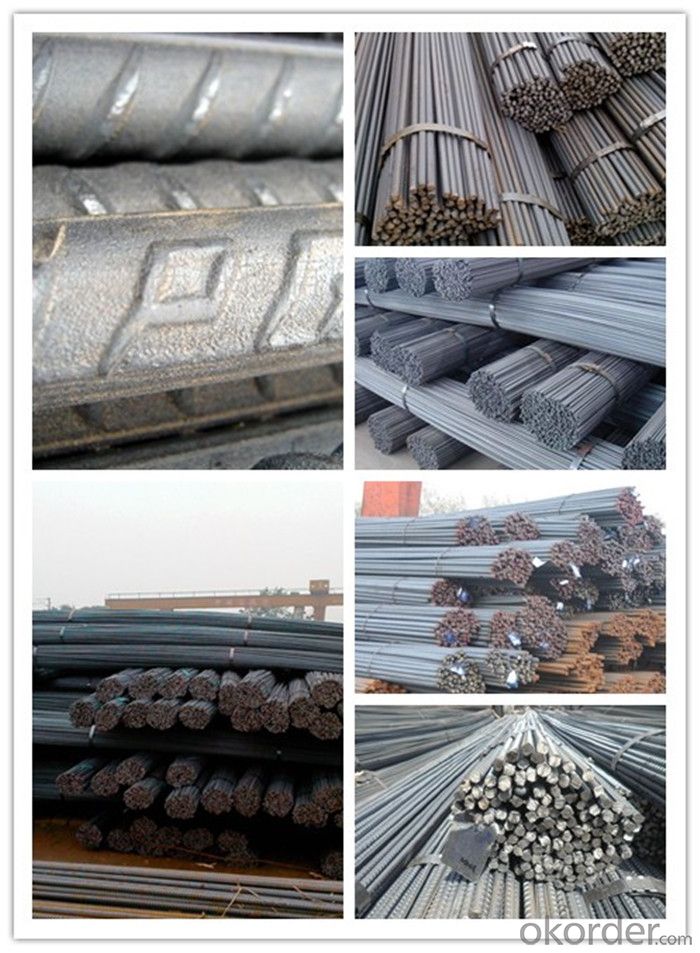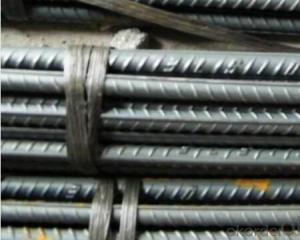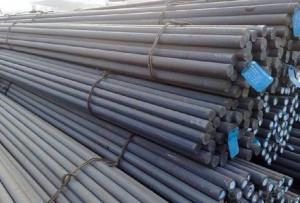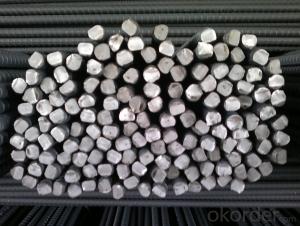Hrb500 Deformed Steel Bars in Stock
- Loading Port:
- Tianjin
- Payment Terms:
- TT OR LC
- Min Order Qty:
- 100 m.t.
- Supply Capability:
- 50000 m.t./month
OKorder Service Pledge
OKorder Financial Service
You Might Also Like
Specification
Hrb500 Deformed Steel Bars in Stock
Description of Hrb500 Deformed Steel Bar:
1, Diameter: 5.5mm-10mm Hrb500 deformed steel bars
10m- 40mm Hrb500 Deformed Steel Bar
2, Length: 6m, 9m, 12m or customized
3, Standard: GB, ASTM, AISI, SAE, DIN, JIS, EN
2, Produce Process: hot rolled or forged to get the steel round bar and plate
3, Heat Treatment: annealing, normalizing, tempering, quenching
4, Surface Treatment: Black Polish Bright
5, Quality Assurance: You can ask testing organizations such as SGS, BV, etc. to test our products before shipping.
Chemical Composition of Hrb500 Deformed Steel Bars:
Grade | Technical data of the original chemical composition(%) | |||||
Reinforcing steel bar HRB335 | C | Mn | Si | S | P | B |
≤0.25 | ≤1.60 | ≤0.80 | ≤0.045 | ≤0.045 | >0.0008 | |
Physics Capability | ||||||
Yield Strength(N/cm2) | Tensile Strength(N/cm2) | Elongation(%) | ||||
≥ 335 | ≥490 | ≥16 | ||||
Reinforcing steel bar HRB400 | C | Mn | Si | S | P | B |
≤0.25 | ≤0.16 | ≤0.80 | ≤0.045 | ≤0.045 | 0.04-0.12 | |
Physics Capability | ||||||
Yield Strength(N/cm2) | Tensile Strength(N/cm2) | Elongation(%) | ||||
≥ 400 | ≥ 570 | ≥ 14 | ||||
Product Show of Hrb500 Deformed Steel Bars:
Company Information:
CNBM International Corporation is the most important trading platform of CNBM group.
Whith its advantages, CNBM International are mainly concentrate on Cement, Glass, Iron and Steel, Ceramics industries and devotes herself for supplying high qulity series of refractories as well as technical consultancies and logistics solutions.

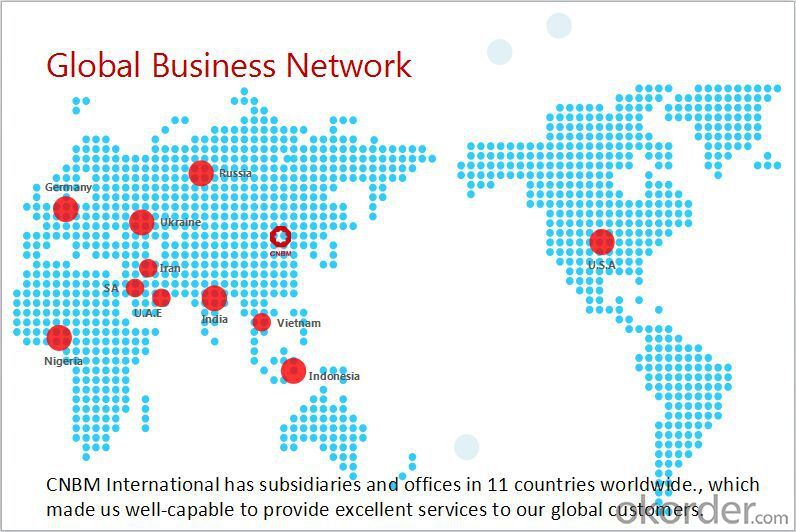
FAQ:
1, Your advantages?
professional products inquiry, products knowledge train (for agents), smooth goods delivery, excellent customer solution proposale
2, Test & Certificate?
SGS test is available, customer inspection before shipping is welcome, third party inspection is no problem
3, Factory or Trading Company?
CNBM is a trading company but we have so many protocol factories and CNBM works as a trading department of these factories. Also CNBM is the holding company of many factories.
4, Payment Terms?
30% TT as deposit and 70% before delivery.
Irrevocable L/C at sight.
5, Trading Terms?
EXW, FOB, CIF, FFR, CNF
6, After-sale Service?
CNBM provides the services and support you need for every step of our cooperation. We're the business partner you can trust.
We'll reply you in our first priority within 24 hours.
- Q: What are the challenges in manufacturing special steel?
- One major challenge in manufacturing special steel is the complex and precise process involved. Special steel requires specific chemical compositions and mechanical properties, which can be difficult to achieve consistently. Additionally, the production of special steel often involves sophisticated technologies, such as vacuum melting or controlled atmosphere furnaces, which require advanced skills and specialized equipment. Furthermore, meeting the stringent quality standards and tolerances of special steel can be demanding, as any deviation can lead to rejected batches. Overall, the challenges lie in maintaining consistent quality, meeting strict specifications, and effectively utilizing advanced manufacturing techniques.
- Q: How is special steel used in the production of aircraft landing gear?
- Due to its outstanding mechanical properties and durability, special steel is extensively utilized in the manufacturing of aircraft landing gear. The landing gear, a critical component responsible for supporting the weight of an aircraft during takeoff, landing, and ground operations, must endure tremendous forces, impact loads, and harsh environmental conditions. Special steel, including high-strength low-alloy (HSLA) steel or alloy steel, is carefully chosen for its remarkable strength-to-weight ratio, high resistance to fatigue, and excellent ability to resist corrosion. These characteristics are essential in ensuring that the landing gear can withstand the extreme forces and stresses encountered during aircraft operations. The utilization of special steel in the production of landing gear offers multiple advantages. Firstly, it enables the landing gear to be lighter in weight, contributing to an overall reduction in the aircraft's weight. This results in improved fuel efficiency and increased capacity for carrying cargo, which are crucial factors in enhancing the performance of modern aircraft and reducing operating costs. Secondly, the high fatigue resistance of special steel ensures that the landing gear can endure repeated loading cycles without experiencing significant degradation in performance. This is of utmost importance since the landing gear is subjected to substantial stress during each landing and takeoff. It must be capable of withstanding these forces over a long operational lifespan. Furthermore, the excellent corrosion resistance properties of special steel guarantee that the landing gear remains protected from environmental elements such as moisture, salt, and other corrosive substances. Corrosion can weaken the structure of the landing gear, compromising its integrity and safety. Therefore, the use of special steel helps to ensure the longevity and reliability of the landing gear, reducing the need for maintenance and associated costs. To summarize, special steel plays a vital role in the manufacturing of aircraft landing gear due to its exceptional strength, fatigue resistance, and corrosion resistance. Its incorporation allows for the production of lighter and more durable landing gear, resulting in improved aircraft performance, enhanced efficiency, and increased safety.
- Q: What are the properties of tungsten alloys?
- Tungsten alloys possess several notable properties, including exceptional hardness, high melting point, excellent corrosion resistance, and remarkable density. These alloys are also known for their exceptional strength, resistance to wear, and ability to retain their shape even under extreme temperatures. Furthermore, tungsten alloys exhibit good electrical and thermal conductivity, making them suitable for various applications in industries such as aerospace, automotive, and defense.
- Q: How does special steel perform in case hardening applications?
- In case hardening applications, the performance of special steel is outstanding. Case hardening, a heat treatment process, is used to increase the surface hardness of a material while maintaining its tough and ductile core. Special steel, also known as alloy steel, is specifically formulated to have enhanced properties like high strength, toughness, and wear resistance. When it comes to case hardening, special steel is the ideal choice due to its ability to form a hard outer layer while retaining its core properties. Typically, the process involves heating the steel to a specific temperature and then introducing a carbon-rich environment, such as through carburizing or carbonitriding. The carbon atoms diffuse into the steel's surface, creating a high-carbon layer called the case, which significantly increases hardness and wear resistance. Compared to other types of steel, special steel's high carbon content allows for deeper and more uniform case hardening. This results in improved durability, reduced friction, and enhanced resistance to wear, abrasion, and impact. Moreover, the tough core of special steel ensures that the material remains resistant to cracking or fracturing under high stress or impact loads. Furthermore, special steel offers excellent machinability, making it easy to process during case hardening applications. This makes it a preferred choice for various industries, including automotive, aerospace, tooling, and manufacturing, where components require both high surface hardness and structural integrity. Overall, special steel is highly regarded for its exceptional performance in case hardening applications. Its combination of high strength, toughness, wear resistance, and machinability makes it an excellent choice for producing durable and reliable components that can withstand demanding operating conditions.
- Q: Can special steel be used in the textile manufacturing industry?
- Yes, special steel can be used in the textile manufacturing industry. Special steel, such as stainless steel or high carbon steel, can be utilized in textile machinery parts, needles, or cutting tools due to their durability, corrosion resistance, and strength. These properties make special steel suitable for various processes involved in textile manufacturing, such as weaving, knitting, or cutting fabrics.
- Q: How does special steel perform in abrasive wear applications?
- Special steel is known for its excellent performance in abrasive wear applications. It is specifically designed to withstand the harsh conditions and high levels of abrasion that occur in various industrial processes. One of the key features of special steel is its exceptional hardness. It is able to resist the abrasive forces exerted by different materials, such as rocks, sand, or minerals, without experiencing significant wear or deterioration. This hardness is achieved through a combination of alloying elements and heat treatment processes, which enhance the steel's ability to retain its structural integrity even under extreme wear conditions. Additionally, special steel often possesses a high level of toughness, which allows it to absorb impact and resist fracture or chipping. This property is particularly important in abrasive wear applications, where materials constantly collide and generate high levels of stress. The toughness of special steel enables it to withstand these impacts and maintain its performance over a long period of time. Furthermore, special steel can exhibit excellent resistance to corrosion, which is crucial in abrasive wear applications that involve exposure to moisture, chemicals, or other corrosive agents. This resistance ensures that the steel does not deteriorate or lose its effectiveness due to chemical reactions or oxidation, extending its lifespan and reducing maintenance requirements. In summary, special steel performs exceptionally well in abrasive wear applications due to its hardness, toughness, and corrosion resistance. These properties enable it to withstand the harsh conditions and high levels of abrasion encountered in various industrial processes, ensuring long-lasting performance and reduced downtime.
- Q: What are the different heat treatment methods used for special steel?
- There are several heat treatment methods used for special steel, including annealing, quenching, tempering, normalizing, and case hardening.
- Q: What are the main characteristics of magnetic steel forgings?
- The main characteristics of magnetic steel forgings are high strength, excellent wear resistance, and good magnetic properties. These forgings are known for their durability and ability to withstand extreme conditions. They also have good machinability and can be easily formed into various shapes.
- Q: What are the different methods for nitriding special steel?
- There are several methods for nitriding special steel, including gas nitriding, salt bath nitriding, plasma nitriding, and ion nitriding.
- Q: What are the different methods for shot peening special steel?
- Shot peening is a widely used method for improving the fatigue strength and performance of special steels. There are several different methods for shot peening special steel, each with its own advantages and considerations. 1. Air Shot Peening: This is the most common and traditional method of shot peening. It involves propelling small steel shots at high speeds using compressed air. Air shot peening is effective for treating large surfaces and achieving uniform coverage. It is suitable for most special steels, but may not be suitable for certain delicate or highly sensitive materials. 2. Wheel Shot Peening: In this method, steel shots are propelled using a rotating wheel. Wheel shot peening is particularly effective for treating small or intricate parts, as it offers better control and accuracy. It is commonly used for shot peening gears, shafts, and other components with complex geometries. 3. Wet Shot Peening: This method involves shot peening in a wet environment, usually using a mixture of water and shot media. Wet shot peening offers increased control over shot flow and reduces dust formation. It is often preferred for shot peening special steels that are highly sensitive to heat or have a risk of distortion. 4. Ultrasonic Shot Peening: This advanced method utilizes high-frequency vibrations to propel the shot media onto the steel surface. Ultrasonic shot peening offers enhanced control over shot velocity and impact energy, resulting in improved surface finish and fatigue life. It is particularly useful for shot peening thin or delicate special steels. 5. Laser Shot Peening: This method employs laser pulses to generate shockwaves on the steel surface, causing compressive residual stresses. Laser shot peening is highly precise and can be controlled to treat specific areas or patterns. It is often used for shot peening special steels that require localized treatment or have complex geometries. It is important to note that the selection of the shot peening method depends on various factors, including the type of special steel, component geometry, required surface finish, and desired residual stress profile. Therefore, it is essential to consult with shot peening experts or engineers to determine the most suitable method for shot peening special steel.
Send your message to us
Hrb500 Deformed Steel Bars in Stock
- Loading Port:
- Tianjin
- Payment Terms:
- TT OR LC
- Min Order Qty:
- 100 m.t.
- Supply Capability:
- 50000 m.t./month
OKorder Service Pledge
OKorder Financial Service
Similar products
Hot products
Hot Searches
Related keywords
